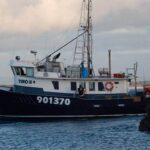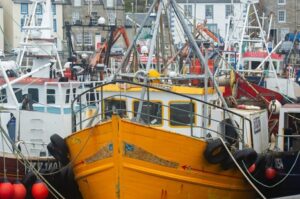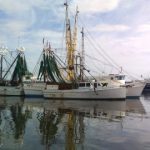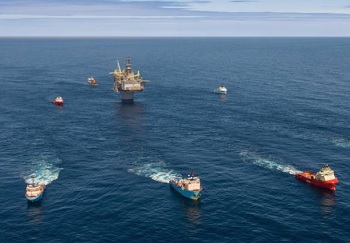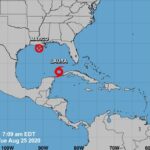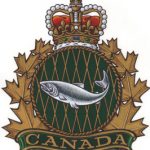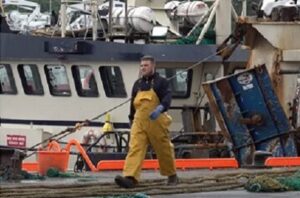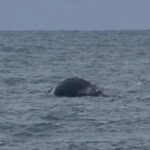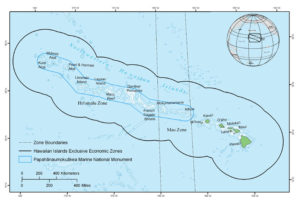Tag Archives: Great Lakes Fishery Commission
“THE FISH THIEF: A Great Lakes Mystery”
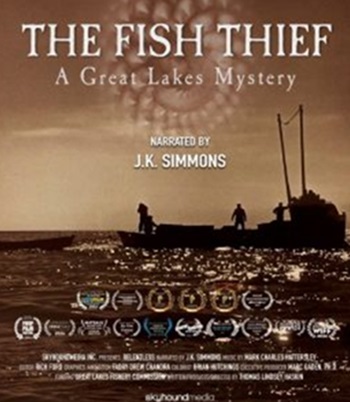 “THE FISH THIEF,” narrated by Oscar-winning actor J.K. Simmons, delves into the extraordinary effort to uncover the cause of a devastating environmental crisis. Was it overfishing, pollutants, or something else? Scientists on both sides of the border worked tirelessly to solve the mystery. In a dramatic eleventh-hour breakthrough, they discovered the true culprit: the invasive sea lamprey. This notorious predator arrived in the Great Lakes in the early twentieth century, triggering an ecological crisis and nearly wiping out populations of lake trout, whitefish, and other cornerstone species. The impact reverberated across the region, ruining local industries, damaging small town economies and indigenous communities, and destroying the livelihoods of people on both sides of the U.S. and Canadian border. A dedicated group of international scientists, policymakers, and conservationists banded together in a race against time to address this ecological invasion. more, >>CLICK TO READ<< 10:42
“THE FISH THIEF,” narrated by Oscar-winning actor J.K. Simmons, delves into the extraordinary effort to uncover the cause of a devastating environmental crisis. Was it overfishing, pollutants, or something else? Scientists on both sides of the border worked tirelessly to solve the mystery. In a dramatic eleventh-hour breakthrough, they discovered the true culprit: the invasive sea lamprey. This notorious predator arrived in the Great Lakes in the early twentieth century, triggering an ecological crisis and nearly wiping out populations of lake trout, whitefish, and other cornerstone species. The impact reverberated across the region, ruining local industries, damaging small town economies and indigenous communities, and destroying the livelihoods of people on both sides of the U.S. and Canadian border. A dedicated group of international scientists, policymakers, and conservationists banded together in a race against time to address this ecological invasion. more, >>CLICK TO READ<< 10:42
After a dramatic decline, lake trout have recovered in most of Lake Superior
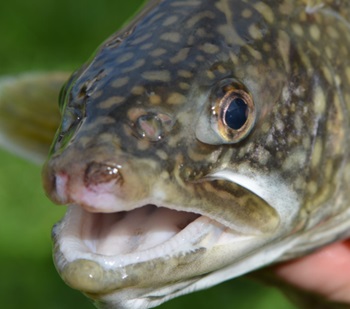 After decades of work, fishery managers say lake trout have fully recovered in most of Lake Superior after the invasive, fish-killing sea lamprey decimated their numbers. The Lake Superior Committee of the Great Lakes Fishery Commission, which is made up of state, tribal and Canadian natural resource managers, announced the population’s recovery Wednesday. The lake trout population in Lake Superior dropped to dramatically low levels during the mid-1900s due to overfishing and an invasion of sea lampreys, eel-like parasites that suck the blood of their hosts. The parasitic fish spread to the Great Lakes from the Atlantic Ocean, invading Lake Superior by 1938. more, >>CLICK TO READ<< 11:03
After decades of work, fishery managers say lake trout have fully recovered in most of Lake Superior after the invasive, fish-killing sea lamprey decimated their numbers. The Lake Superior Committee of the Great Lakes Fishery Commission, which is made up of state, tribal and Canadian natural resource managers, announced the population’s recovery Wednesday. The lake trout population in Lake Superior dropped to dramatically low levels during the mid-1900s due to overfishing and an invasion of sea lampreys, eel-like parasites that suck the blood of their hosts. The parasitic fish spread to the Great Lakes from the Atlantic Ocean, invading Lake Superior by 1938. more, >>CLICK TO READ<< 11:03
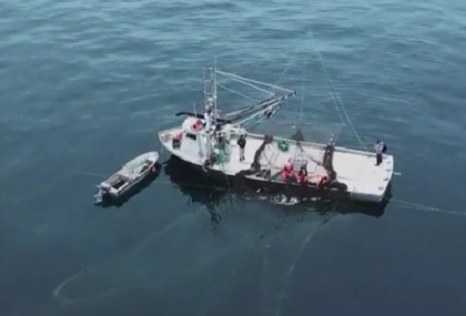
Federal Relief: Great Lakes fisheries finally get a cut of Coronavirus relief funds
After being snubbed in 2020, the folks who make their living by fishing the Great Lakes – both commercially and for sport – have been included in the latest round of federal relief from the economic ravages of COVID-19.,, Neither group was included in the massive Coronavirus Aid, Relief, and Economic Security Act that passed in March 2020, even though $300 million was specifically earmarked for U.S. fisheries.,, Getting the Great Lakes included in CRRSA was just the beginning. Now comes the harder work of figuring out how to access the money. Video, >click to read< 16:10
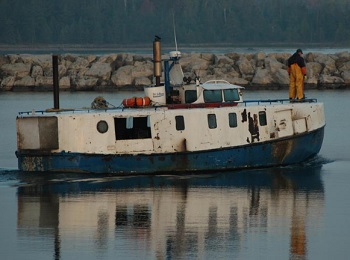
Congress gave $300 million to help fisheries. The Great Lakes got zero. Why were they left out?!
The nationwide shutdown was especially ill-timed for fishers in the Great Lakes. “We had reports of commercial fishermen in Michigan who had a catch with absolutely nowhere to sell it,” Luckily, there was a plan in place to help commercial fishers and charter boats. But when it came time to distribute that funding, most of the Great Lakes states were left out altogether. That came as a shock to many fishers. “Right up until the final hour, a lot of the Great Lakes fishery participants thought that they were going to be included,” says Gravelle. Why the Great Lakes were left out? >click to read< 14:53
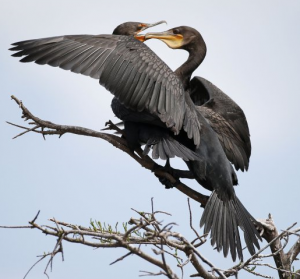
Cormorant, Fisheries Act concerns need to be addressed
Cormorant management and Canada’s Fisheries Act are just two of the issues that members of the Committee of Advisors to the Great Lakes Fishery Commission have raised and want action taken on by the Canada and US governments,,, “One of the concerns our committee has raised is with Canada’s Fisheries Act proposals-in particular with proposed marine protected areas,” Mr. Purvis told the Recorder.,, Another area of concern, said Mr. Purvis, is for needed cormorant management control. “I know in areas like the Les Cheneaux Islands in the US there are no fish left due to cormorants. They decimated the perch fishery for instance. And the US government had at one time allowed for a cull of cormorants, then they took this away. Now the perch fishery in that area is gone.“ >click to read<08:15
Concerns linger over Lake Superior’s historic herring fishery
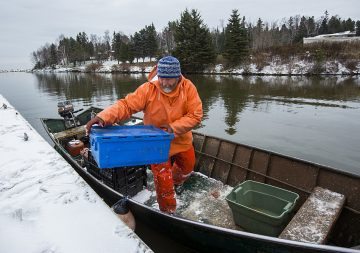 Minnesota fisheries managers are concerned about the long term health of the lake herring fishery in Lake Superior. Biologists worry not enough young herring are surviving to sustain the fishery, while at the same time demand for the fish has spiked. Minnesota’s 25 or so commercial fishermen who ply the waters off the North Shore have caught a lot fewer cisco in recent years. The herring, or cisco, fishery is always unpredictable, said Steve Dahl, a commercial fisherman who works out of the Knife River marina on the North Shore of Lake Superior. The last few falls have been tough for Dahl, whose nets have yielded fewer herring at a crucial time of year. This year was different, though. “November was really good, one of the better ones I’ve had,” he said. “Towards the end I sort of got overwhelmed, it was just too much.” Read the story here 11:21
Minnesota fisheries managers are concerned about the long term health of the lake herring fishery in Lake Superior. Biologists worry not enough young herring are surviving to sustain the fishery, while at the same time demand for the fish has spiked. Minnesota’s 25 or so commercial fishermen who ply the waters off the North Shore have caught a lot fewer cisco in recent years. The herring, or cisco, fishery is always unpredictable, said Steve Dahl, a commercial fisherman who works out of the Knife River marina on the North Shore of Lake Superior. The last few falls have been tough for Dahl, whose nets have yielded fewer herring at a crucial time of year. This year was different, though. “November was really good, one of the better ones I’ve had,” he said. “Towards the end I sort of got overwhelmed, it was just too much.” Read the story here 11:21
Scientific panel will evaluate proposals to establish commercial fish farms in Great Lakes
 Department of Environmental Quality officials said in March they’d heard from two operators interested in raising rainbow trout in netted enclosures in Lakes Michigan and Huron. They would take fish from small hatcheries and raise them until large enough for the consumer food market. Among members are scientists with the NOAA Great Lakes Ecological Laboratory in Ann Arbor, the Great Lakes Fishery Commission, Michigan Sea Grant and others. The chairman is Roy Stein, a professor emeritus at Ohio State University. Bad idea Read the rest here 13:14
Department of Environmental Quality officials said in March they’d heard from two operators interested in raising rainbow trout in netted enclosures in Lakes Michigan and Huron. They would take fish from small hatcheries and raise them until large enough for the consumer food market. Among members are scientists with the NOAA Great Lakes Ecological Laboratory in Ann Arbor, the Great Lakes Fishery Commission, Michigan Sea Grant and others. The chairman is Roy Stein, a professor emeritus at Ohio State University. Bad idea Read the rest here 13:14
Sea lampreys may be established in inland waterway
 The findings are preliminary but show the importance of determining whether the same thing is happening in other inland lakes, said Marc Gaden, spokesman for the Great Lakes Fishery Commission, which spends about $21 million a year keeping lamprey numbers down Read more@grandhaventribune 11:51
The findings are preliminary but show the importance of determining whether the same thing is happening in other inland lakes, said Marc Gaden, spokesman for the Great Lakes Fishery Commission, which spends about $21 million a year keeping lamprey numbers down Read more@grandhaventribune 11:51
Public Forum On Threats Facing Great Lakes In Kincardine, Ontario
 A public forum on threats facing Lake Huron and the other Great Lakes is set for August 24th in Kincardine. One of the topics will be the ecological and economic impact of invasive species. more@blackburnnews
A public forum on threats facing Lake Huron and the other Great Lakes is set for August 24th in Kincardine. One of the topics will be the ecological and economic impact of invasive species. more@blackburnnews

































